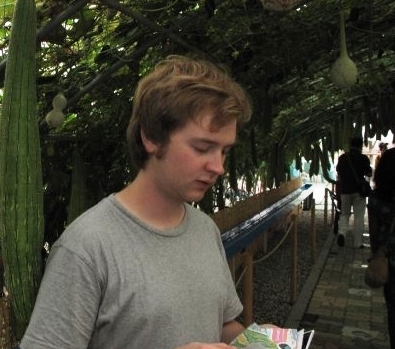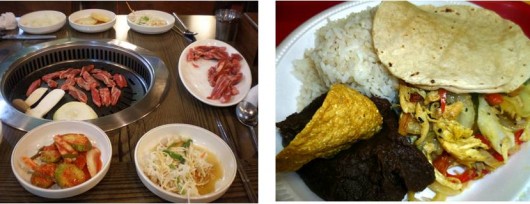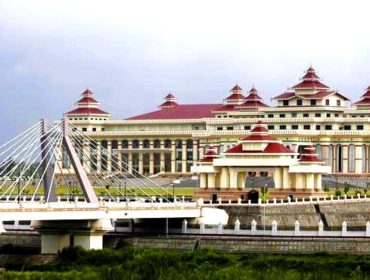By Josh White
Gwang Cheol Park saw his first public execution at 14 years old.
Park, now a 29-year-old North Korean defector and human rights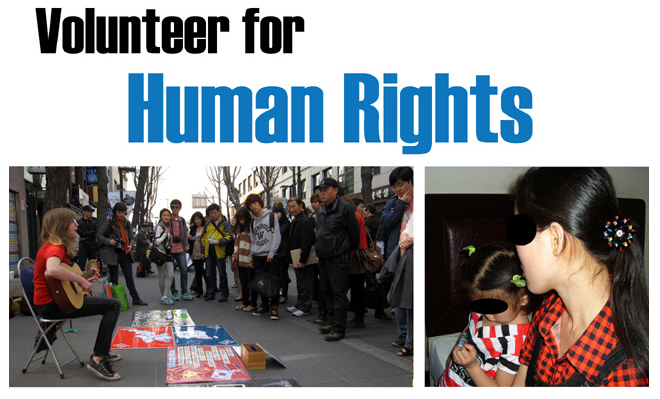 activist living in South Korea, can’t forget the morning his schoolteacher made him watch a lineup of soldiers shoot a man twelve times. Being forced to witness public killings is part of a child’s education in the Democratic People’s Republic of Korea. It certainly taught Park to follow the rules.
activist living in South Korea, can’t forget the morning his schoolteacher made him watch a lineup of soldiers shoot a man twelve times. Being forced to witness public killings is part of a child’s education in the Democratic People’s Republic of Korea. It certainly taught Park to follow the rules.
But still, Park held a dream of the prosperity he might enjoy in China. He escaped from his famished country for the first time as a 17-year-old in 1998. In China, he couldn’t find work, but he learned a lot by unlearning the many lies about the outside world he’d believed his whole life. For example: He discovered that South Korea was a sovereign nation, and not, as he’d always been told, an American colony. Though he tried not to arouse the suspicions of neighbors and local authorities, he eventually was found out and forced onto a flight back to his homeland.
He’d never ridden an airplane. North Koreans hardly can travel within their own country on foot, much less take off from a runway. Park couldn’t help but feel excited, though he feared death upon landing.
He survived four months of hard labor and reeducation in prison (he said he would have received a harsher sentence had he not been a minor), toiling alongside other malnourished enemies of the state, some of them pregnant women. One morning Park tried to shake his friend awake. He wouldn’t budge. He’d died sometime before morning. Another day kicked off with several minutes of malnutrition-induced blindness.
After his release, Park couldn’t simply accept the lies his government told, or stomach the praise his family and neighbors lavished on deceptive godlike leaders. He wanted to tell his countrymen the truth, but knew he’d be killed for it. He decided to try escape again. Park made it back across the Chinese border, and in China met a missionary who would lead him to South Korea, where he earned a university degree in business administration.
Gwang Cheol Park (a pseudonym he uses to protect his identity) told his story to a few dozen curious listeners in the basement of the KISES language hagwon, near the Sinchon subway station in Seoul on Saturday, May 7, 2011 as part of an all-day volunteer orientation workshop held by Justice for North Korea (JFNK), a grassroots volunteer-based activist organization which since 2007 has addressed the humanitarian crisis in North Korea by spreading international awareness as well as helping defectors escape their country to find better lives abroad.
The workshop on May 7th was the third volunteer program JFNK has held in 2011. Throughout the day, organizers for JFNK, and leaders of other organizations dedicated towards helping North Koreans, sought to educate foreign and native Korean volunteers on the issues surrounding the crisis, to illustrate the severity of the issues, and get volunteers thinking of new ways to help. (Note: JFNK also held a Korean-language version of the workshop on May 14.)
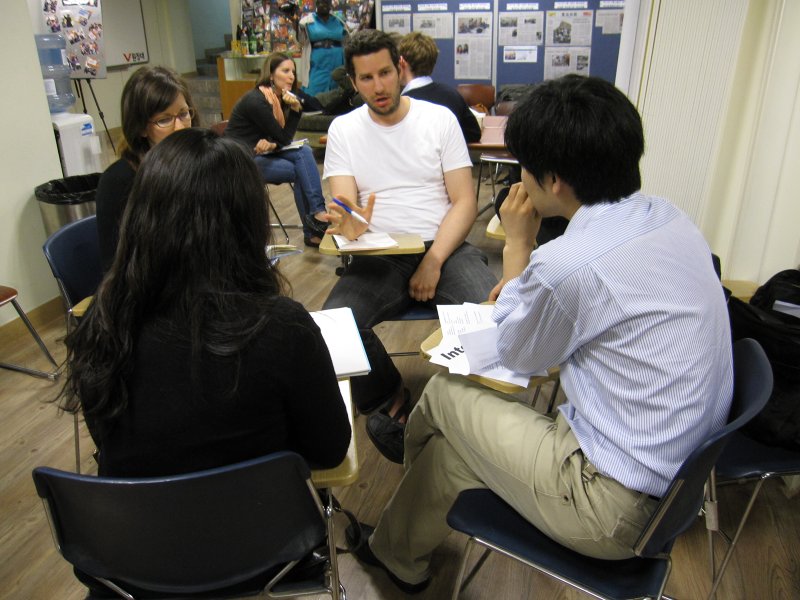
“I’m really excited about the turnout,” said Dan Bielefeld, a webmaster for the Network for North Korean Democracy and Human Rights, and a volunteer activist for JFNK since 2007. “It remains to be seen what happens, but in terms of awareness, it’s a big success.”
JFNK is now applying for non-governmental organization (NGO) status, which will allow it access to government grants. But for now it works under a miniscule budget, depending on volunteers to succeed in its goals, Bielefeld explained to the workshop group.
“Right now,” said Bielefeld, “we’re running on volunteer effort.”
Some may already know JFNK by its weekly awareness campaigns, during which musicians, singers and artists have joined with the organization to reach out to people walking the streets of Insadong. Though JFNK has, as of March, begun going a more artistic/musical route with their awareness campaigns, volunteers often have sought attention by delivering a startling performance, one depicting a North Korean soldier abusing a repatriated refugee. The scenes have been shocking and convincing enough that police have visited to make sure they were staged, said Peter Jung, a South Korean pastor who founded and now leads JFNK.
Jung has for years worked to not only raise awareness on the humanitarian issue, but also to personally lead defectors to freedom along an underground railroad cutting through China and Vietnam. He’s a dedicated activist, having served a year-and-a-half prison term in China for helping North Koreans there. He, Park, and Bielefeld were among the guests who spoke on hardships North Koreans face in their own country, inside China for those who’ve crossed the border, and inside South Korea for those defectors who’ve completed a journey rife with danger yet struggle to assimilate into the culture south of the 38th parallel.
The North
Sang Hun Kim, a retired World Food Program officer, and current activist and chairman of the Database Center for North Korean Human Rights (NKDB), began the day by informing volunteers on the proof of Kim Jong Il’s atrocities his organization has gathered. Kim said he hopes the research – which includes statistics as well as testimonies similar to Park Gwang Cheol’s – will gain the attention of the International Criminal Court, as well as put pressure on the United Nations to act against human rights violations committed in North Korea.
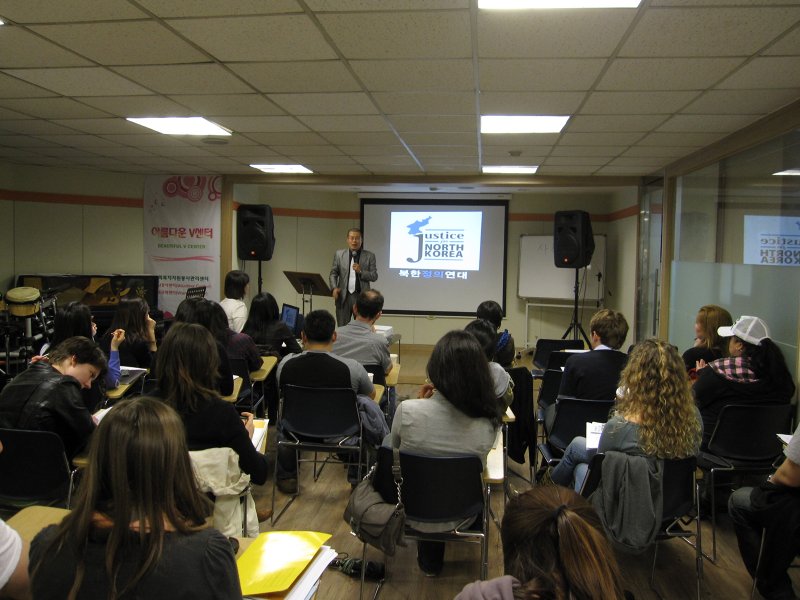
Peter Jung presented to the group vivid examples of such violations in the form of graphic illustrations which defectors drew based on their experiences in DPRK prison camps. One picture presents a guard beating a starving inmate for eating cow excrement. A pregnant woman performs a table dance for guards’ amusement. Another expecting mother lies beneath a long wooden board. Two fellow prisoners, at gunpoint, jump up and down, pulverizing the unborn child. Another guard opts for a simpler method of pregnancy termination: repeated kicks to the stomach. Prisoners are ordered to stick their hands through small openings in their cells to receive savage thrashings, for no discernable reason other than simple cruelty. Hungry dogs rip apart dead bodies.
China
Sang Hun Kim discussed the South Korean government’s complacency in the suffering of North Koreans who’ve escaped into China. The North Korean government’s official policy is to request that Chinese officials automatically repatriate escaped North Koreans caught within China. Meanwhile, the South Korean government has made no official requests to the Chinese government to refrain from repatriating North Koreans, a policy of inaction which enables the Chinese to continue disregarding their refugee statuses. Without an official request by the South Korean government, said Kim, there is no need for official Chinese compliance.
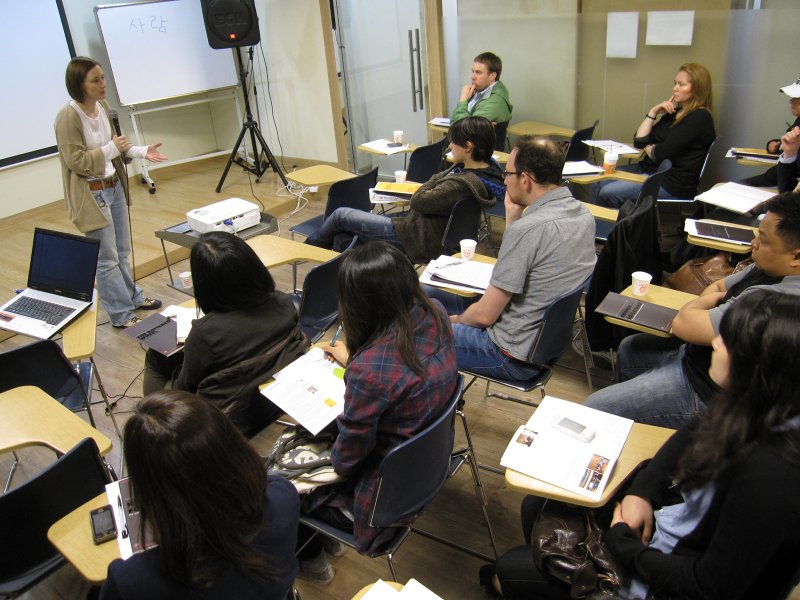
Joanna Hosaniak, head of international campaigns and cooperation with the Citizens’ Alliance for North Korean Human Rights elaborated on the plight of North Korean women and children living in China. As Hosaniak explained, the Chinese government is loath to give legal status to North Koreans, partially to prevent an influx of refugees. Despite the government policy, many rural Chinese men marry nonresident Korean women. Some wives enjoy harmonious lives with their husbands and families, and decide to stay in China. Many, however, are taken advantage of by human traffickers and abused by their Chinese families. They can’t turn to the police for fear of deportation to North Korea, where they will face harsh punishments for having left. Many times, mothers will risk their lives to venture into South Korea. Their children often wait in China hoping one day to rejoin them.
The South
North Koreans face a host of challenges in coping with life in South Korea, as Kyung Hee Kim, the director of Jayoutuh, a school for North Koreans who are attending or preparing to attend college, explained to volunteers, drawing from her experiences with Jayoutuh as well as her time as a dorm mother at Yeomyung School.
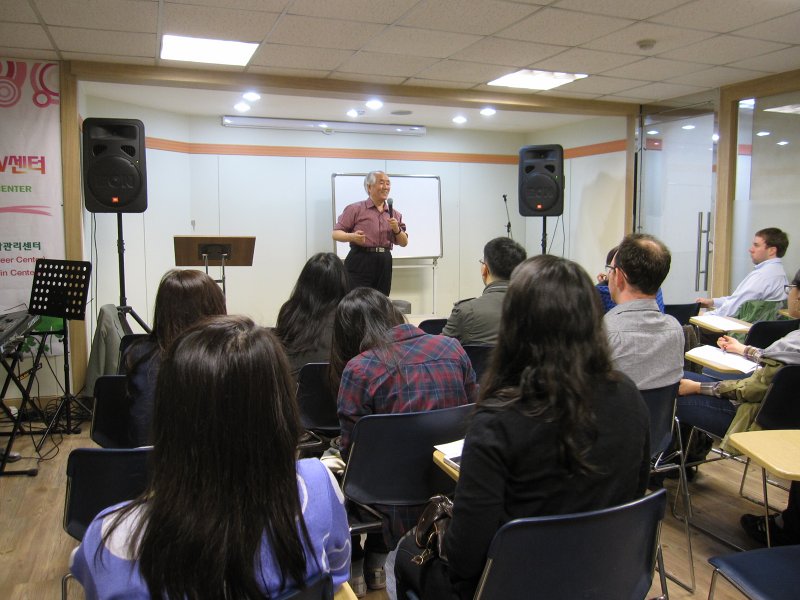
One of the main challenges is language. Though defectors speak the same tongue as South Koreans, they encounter language difficulties due to the different accents and dialects – and an abundance of English loan words – used in the ROK. Even college graduates find trouble securing jobs because of their communication problems.
To give one example of a language problem, even Park, who has lived in South Korea for 10 years, said cab drivers still ask where he’s from.
Beyond language difficulties, North Koreans may confront problems in their new lives because they spent their old lives strongly discouraged from asking “why?”. In the DPRK, openly inquisitive, freethinking people are severely punished, and therefore a big challenge for Kyung Hee Kim and others helping defectors is getting them to think on their own, so that they can choose suitable college majors and career paths.
Those who do find jobs may remain ignorant of South Korean culture, which could lead to unpleasant misunderstandings in the workplace. For example: an office supervisor may complain that he’s hot. A South Korean employee will take the hint and crack a window, but the boss’s implied request might not register with a defector.
Kyung Hee Kim also told volunteers that North Koreans can have hard times making friends. Without companions to guide them, defectors could be left isolated and thus reliant upon mass media for forming impressions of the world, influences which could result in distorted views of reality (consider the extravagant fantasy scenarios featured in South Korean dramas). What the former North Koreans need from volunteers, said Kim, are people to center them in reality, and to instill in them an accurate representation of the world.
Volunteers
Toward the end of the workshop, Bielefeld informed volunteers that they could help the JFNK, and the many other activist organizations with which it coordinates, by such means as:
-raising money to help defectors
-writing letters to North Koreans; Koreans can translate the letters and send them as radio broadcasts into North Korea. Korean speakers can directly broadcast their own messages into North Korea
-using emerging technologies to break the information barrier to North Korea
-editing English documents for various activists groups
-translating Korean into other languages
-tutoring defectors
After the lectures and Q and A sessions, seminar participants split into different groups to discuss ways to help. Here are a few things they suggested:
-pairing students and tutors through the help of established organizations, like Pscore.
-posting North Koreans’ testimonies on Youtube and social media sites like Facebook
-writing letters to United States government offices, various embassies, and to South Korean government offices, asking them to become more involved
Workshop attendee Robert Lee, a Seoul-based hagwon teacher from Los Angeles – as well as human rights activist and socially-conscious hip hop artist – suggested to workshop volunteers that foreigners get more involved in activism to attract the attention of Koreans, who, said Lee, seem more likely to accept flyers on the street from foreigners than from fellow Koreans.
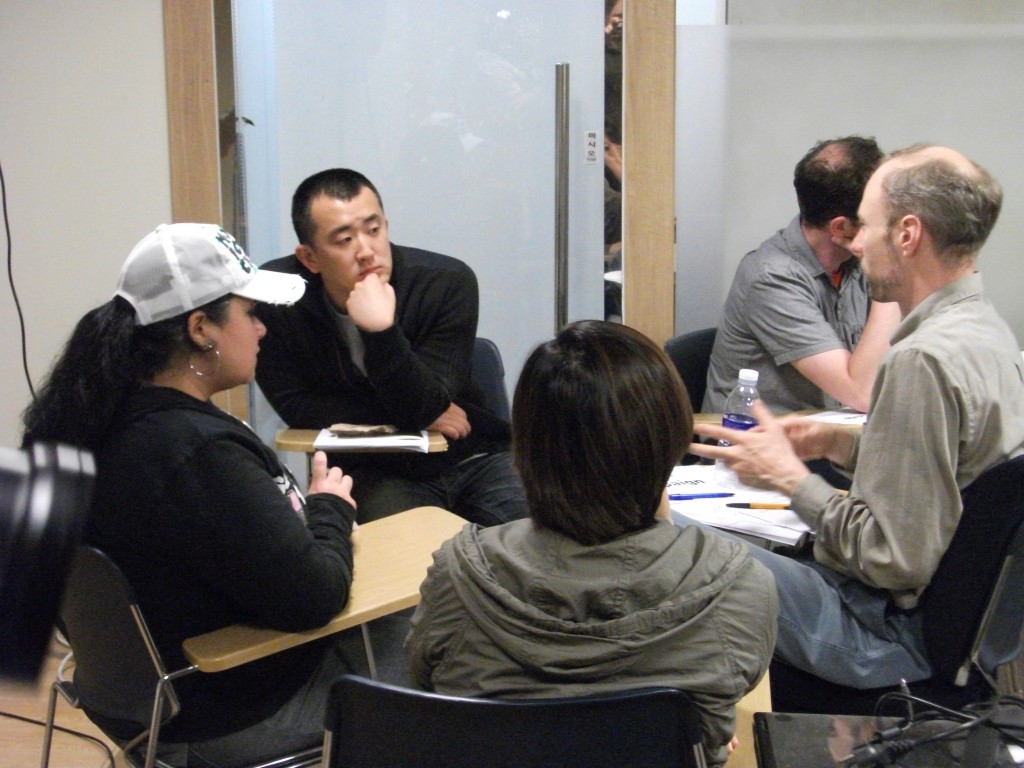
“I enjoyed it. I learned a lot,” said Lee of the workshop. The most compelling part for him was hearing Park’s story. Lee was aware of the issues facing defectors like Park, but found hearing such a story in person especially moving.
Casandra Antoine, a Gyeonggi province public school English teacher from Connecticut, also showed for the workshop. She remembered the first time she saw one of JFNK’s street demonstrations.
“I thought it was interesting. I thought it was a good strategy,” said Antoine, who considers it important for foreigners to spread the word on the North Korean issue back in their own countries. For instance: In the U.S., people are aware of the ongoing human rights issue, but don’t realize how intense the situation really is, or what people must go through to escape it.
“It’s not just a Korean issue,” said Kelly Bryan, a hagwon kindergarten teacher from Peru, Illinois, who looks forward to helping defectors through tutoring. Bryan finds JFNK compelling because it gets her thinking more about the people of North Korea, and beyond the strange, isolated, Cold War-era relic image of the country. She’s so far volunteered at one street campaign, and was struck by the interest that both foreign and native passersby showed. She remembers an elderly Korean man approaching her, taking her hands in his, and in English telling her: “Don’t worry. Everything will be okay.”
For Bryan, any human rights problem in the world is not limited to one country; in an increasingly globalized world more countries can work toward solving the kinds of problems North Koreans face.
What’s Next
Bielefeld wound down the day by saying JFNK will scale back the weekly street campaigns to a monthly basis to focus on other approaches, including ideas workshop attendees suggested.
JFNK held its general meeting on May 21st, from 1 to 2:30 pm, followed by a street campaign from 3 to 5 pm. It’s just one part of a busy May for the group. The month also will include “Justice for North Korea Week,” from May 22nd to the 28th. The organization will hold a documentary screening on the 27th, as well as a forum on the 28th featuring two former North Korean refugees now living in Seoul as college students. JFNK also will put on “The Concert for Love and Freedom of North Korea” on May 26, from 4 to 6 p.m. at the National Assembly Memorial Hall, an event which, by the way, will require much volunteer work to prepare.
For more information on the updated schedule of Justice for North Korea, and how to get involved, visit the official Web site, their Facebook page, and subscribe to their weekly email by sending a message to rescuenorthkorea@gmail.com.
___________________________________________________________
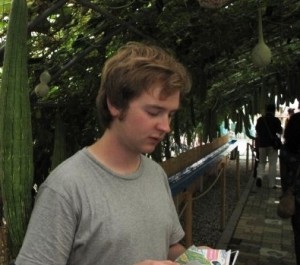 Josh White is an American from Atlanta, Georgia. He currently works in Seoul as a public middle school English teacher.
Josh White is an American from Atlanta, Georgia. He currently works in Seoul as a public middle school English teacher.
 Print This Post
Print This Post



